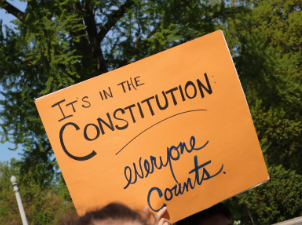
Guest Blog: Prison-Based Gerrymandering Conflicts with Our Principles and Undermines Democracy
Libbey Detcher
April 30, 2021
In the wake of the 2020 Census, gerrymandering – the strategic and partisan redrawing of electoral district lines – is again a concern. Gerrymandering has disastrous effects: it undermines the will of the people drastically alters the United States political landscape. In 2018, the Center for American Progress published a report on gerrymandering and found that the process of unfair redistricting impacted 59 seats in the United States House of Representatives between 2012 and 2016. Today, gerrymandering by politicians and statisticians is generally recognized as a problem that affects voters across the United States, but less familiar is the disenfranchisement produced by prison-based gerrymandering.
Gerrymandering in any form is contrary to the moral responsibility we have to make sure every person is fairly represented and has equal access to participate in political institutions. Prison-based gerrymandering particularly creates a political system that fails to recognize and honor the human dignity of people who are incarcerated.
Prison gerrymandering distorts democracy in a different light than simply redrawing district lines. Since the first federal census in 1790, the United States Census Bureau has counted incarcerated persons as part of the population in districts where they’re incarcerated rather than the district of their permanent address. This artificially inflates representation of rural districts where prisons are located. Simultaneously, it dilutes the political power of districts with higher percentages of incarcerated residents. A law student intern at Yale Law School’s Peter Gruber Rule of Law clinic, Nicole Billington, researched how this little known practice “diminishes the voting power of people in urban districts.”
With people of color disproportionately facing incarceration, prison gerrymandering disproportionately diminishes the political power of communities of color. The vast majority of penitentiaries are located in rural or suburban predominantly white communities, however, most elected officials are unlikely to take their incarcerated residents into account as constituents who they represent and serve. In fact, people who are incarcerated do not have access to public goods or services located outside of the prison such as public transportation or schools.
The Sentencing Project estimates that 5.2 million people in the United States face disenfranchisement because of laws that ban voting for people with felony charges. This is 2.27% of the eligible voting population in the United States. While 1 in 59 non-Black voters face disenfranchisement from these bans, The Project reports that 1 in every 16 African-American voters lose the right to vote as a result.
These policies are a familiar echo of the so-called Three-Fifths Compromise. The policy counted enslaved persons as only three-fifths of a person for a state’s population count while simultaneously denying any person of color the right to vote. This shameful, inhumane policy was in place until the adoption of the Fourteenth Amendment in 1868.
In 2019, the first prison gerrymandering case NAACP et al. v. Merrill was argued before a federal court. Families of incarcerated persons, alongside the NAACP, filed a lawsuit claiming that Connecticut’s prison gerrymandering practices violate the Fourteenth Amendment. The U.S. Circuit Court of Appeals approved the lawsuit.
Nine states have successfully passed legislation to end prison gerrymandering: Maryland, New York, California, Colorado, Delaware, Nevada, New Jersey, Virginia, and Washington State. Additionally, Illinois passed similar legislation set to go into effect by 2030.
Prison-based gerrymandering not only undermines democratic principles but runs counter to Catholic social teaching. The Catholic faith emphasizes the importance of civic engagement through the political process. Pope Francis tells us, “A good Catholic meddles in politics.” Catholics cannot turn a blind eye to the disenfranchisement of an incarcerated population or the systemic racism baked in to prison-based gerrymandering.
The Prison Gerrymandering Project, The Sentencing Project, Prison Policy Initiative, and the NAACP Legal Defense Fund are a few advocacy organizations working to end prison-based gerrymandering in the U. S. through litigation, state legislation, the U. S. Census Bureau, and community activism across the country. Congress can put an end to this practice in all states and jurisdictions in one fell swoop by passing the For the People Act (H.R.1/S.1)







